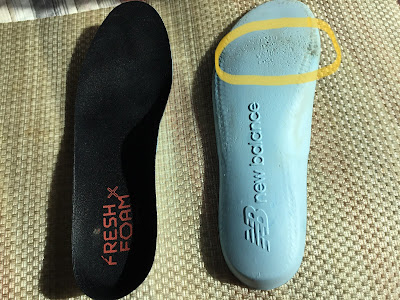Keeping Running Shoes Clean is Important!
Simply put by keeping running shoes clean, they last longer which is a small step toward less shoes in the landfill. If you choose, you may be able to donate or repurpose your clean shoes for a 2nd act. And if the shoe no longer provides the support needed on runs, shoe companies are BEGINNING to take back your shoe for recycling of materials.
After Every Run
Every So Often
 |
| After a month of running dusty trails in the desert, these shoes are in need of a clean! Also tears in the toebox in a couple of areas are noticeable and will need to be repaired. |
Clean shoe in warm water with dish soap and a nylon brush and allow to air dry:
Inserts: remove insert and clean out debris (small pebbles, wood) from inside shoes. With inserts, a tip from elite runners for getting shoes to last longer is to take inserts from their old shoes and put them into new ones, provided the inserts are in good shape. However, if the inserts are breaking down, support on runs can be compromised.
Soles: clean soles of any debris with brush and check for excessive wear worn down to a smooth finish.
Upper: remove laces and do what you can to repair any tears in the upper. Tears can be repaired using THIS VIDEO ON SEWING TEARS IN RUNNING SHOES as a guide. Then clean the upper with soap, water, and a brush.
When to Replace Running Shoes?
If one strictly goes by the numbers, running shoe companies say that shoes should be replaced every 500 km (300 miles). Nevertheless, while running shoes don’t last forever, cleaning your shoes gives you a pretty good idea of when to replace them. Some signs to look for when shoes need to be replaced: 1) insert broken down, 2) tread worn down to a smooth finish, 3) upper losing supportive structure allowing foot to excessively move in shoe, 4) getting slower times, and 5) longer recovery needed after runs.
Donating Shoes
After light repairs and cleaning, shoes can be donated (e.g., shipped to another country) or used for a 2nd act (e.g., walking or doing yard work).
Recycling Shoes
Recycling shoes will be discussed in a future post in the Green Runner series. As mentioned above, it’s BEGINNING to be possible to recycle shoe materials.
* * * * *
The Green Runner Series covers small changes that contribute to running being an even more sustainable activity. Green running was first mentioned in this year's running resolutions. For more check out:
Thanks for reading! If you’ve made it this far, your sharing of this post is much appreciated as it really helps grow the readership of Experiment of One Coaching.
QUESTION or IDEA on a GREEN RUNNING TOPIC?
info@experiment1coaching.com
WEBSITE
Experiment of One Coaching covers topics ranging from running, strength training, health & wellness, sports nutrition to travel.







Comments